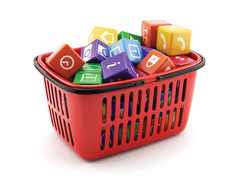Create mobile apps with Qt Creator
Easy Apps

© Lead Image © Denys Rudyi, 123RF.com
Find out how to create a cross-platform app with the veteran tool Qt Creator.
Qt has been around for more than 20 years. During this time, developers have used several approaches to develop graphical interfaces. More specifically, you might recall Qt Widgets [1], Qt Quick [2], and Qt Quick Controls 2 [3]. Qt beginners who want to build mobile, cross-platform apps might perhaps be confused by this diversity, especially since all the technologies are still in use.
Qt runs on different platforms: Desktop, embedded, and mobile. For desktop applications (OS X, Windows, Linux), developers are more likely to go for Qt Widgets, which offers native controls for the user interface. In contrast, Qt Quick, based on an OpenGL implementation, seeks to abstract the UI controls to deploy Qt across platforms. Mobile apps developed with Qt Quick do not look native, nor is their performance very convincing. This changed, however, with Qt 5.7, which introduced the lightweight Qt Quick Controls 2. The name is a bit deceptive, because it is not a new version of Qt Quick, but a completely new development.
Mobile Controls
Qt Quick Controls 2 comes with many additional controls and with new containers that simplify development. Navigation elements, now standard in mobile applications, are also on board. Table 1 shows an overview of the elements provided by Qt Quick Controls 2.
[...]
Buy this article as PDF
(incl. VAT)
Buy Linux Magazine
Subscribe to our Linux Newsletters
Find Linux and Open Source Jobs
Subscribe to our ADMIN Newsletters
Support Our Work
Linux Magazine content is made possible with support from readers like you. Please consider contributing when you’ve found an article to be beneficial.

News
-
The Next Linux Kernel Turns 7.0
Linus Torvalds has announced that after Linux kernel 6.19, we'll finally reach the 7.0 iteration stage.
-
Linux From Scratch Drops SysVinit Support
LFS will no longer support SysVinit.
-
LibreOffice 26.2 Now Available
With new features, improvements, and bug fixes, LibreOffice 26.2 delivers a modern, polished office suite without compromise.
-
Linux Kernel Project Releases Project Continuity Document
What happens to Linux when there's no Linus? It's a question many of us have asked over the years, and it seems it's also on the minds of the Linux kernel project.
-
Mecha Systems Introduces Linux Handheld
Mecha Systems has revealed its Mecha Comet, a new handheld computer powered by – you guessed it – Linux.
-
MX Linux 25.1 Features Dual Init System ISO
The latest release of MX Linux caters to lovers of two different init systems and even offers instructions on how to transition.
-
Photoshop on Linux?
A developer has patched Wine so that it'll run specific versions of Photoshop that depend on Adobe Creative Cloud.
-
Linux Mint 22.3 Now Available with New Tools
Linux Mint 22.3 has been released with a pair of new tools for system admins and some pretty cool new features.
-
New Linux Malware Targets Cloud-Based Linux Installations
VoidLink, a new Linux malware, should be of real concern because of its stealth and customization.
-
Say Goodbye to Middle-Mouse Paste
Both Gnome and Firefox have proposed getting rid of a long-time favorite Linux feature.
